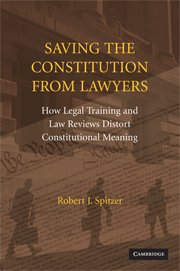 Saving the Constitution from Lawyers
Saving the Constitution from Lawyers 4 - The Unitary Executive and the Commander-in-Chief Power
Published online by Cambridge University Press: 05 June 2012
Summary
During the summer of 2004, a series of internal Bush administration memoranda and reports became public detailing a variety of justifications for the administration's detention, handling, and interrogation of various suspects and combatants captured in the war on terrorism and the war in Iraq. Most of these documents were authored or supervised by administration lawyers including then–White House Counsel Alberto Gonzales; William J. Haynes II, General Counsel to the Department of Defense; David Addington, Counsel to Vice President Dick Cheney; Timothy E. Flanigan, Deputy White House Counsel; Assistant Attorney General Jay Bybee, head of the Department of Justice's Office of Legal Counsel; and John Yoo, Deputy Assistant Attorney General in the Office of Legal Counsel.
The release of these documents prompted considerable criticism aimed at the George W. Bush administration, focusing chiefly on arguments offered in these documents to justify the use of torture by the government. These revelations stood in stark contrast to long-standing American policy rejecting the use of torture. The position articulated by President Bush in June 2003, for example, regarding the use of torture was this: “Freedom from torture is an inalienable human right…. The United States is committed to the worldwide elimination of torture and we are leading this fight by example.” Within a year, however, the administration was reeling not only from release of documents seeking to justify torture but also from revelations of the use of torture by American forces in Afghanistan, at the American-controlled Guantánamo Base on the island of Cuba, and most vividly at the Abu Ghraib prison in Iraq, where videotapes and photographs of prisoners being subjected to a wide variety of “sadistic, blatant, and wanton criminal abuses” by American captors made worldwide news.
- Type
- Chapter
- Information
- Saving the Constitution from LawyersHow Legal Training and Law Reviews Distort Constitutional Meaning, pp. 90 - 128Publisher: Cambridge University PressPrint publication year: 2008


